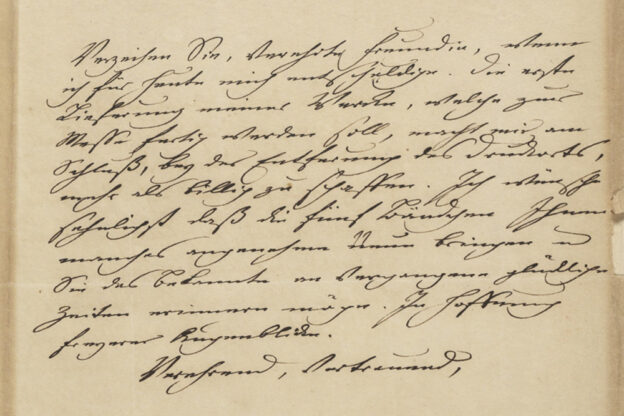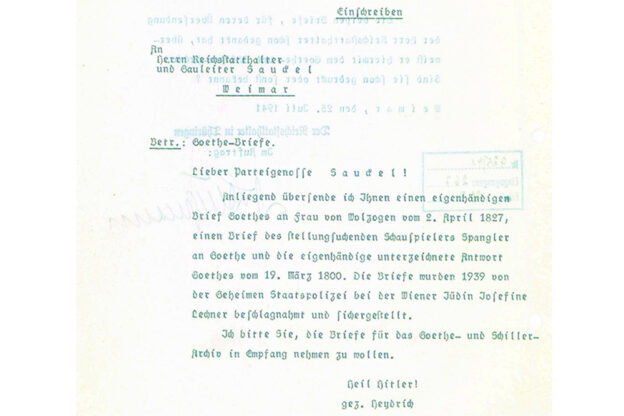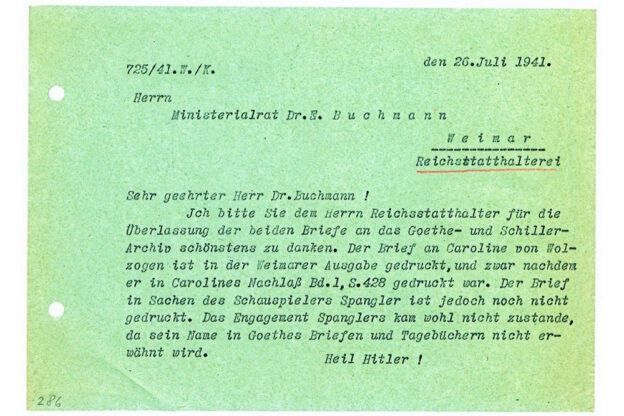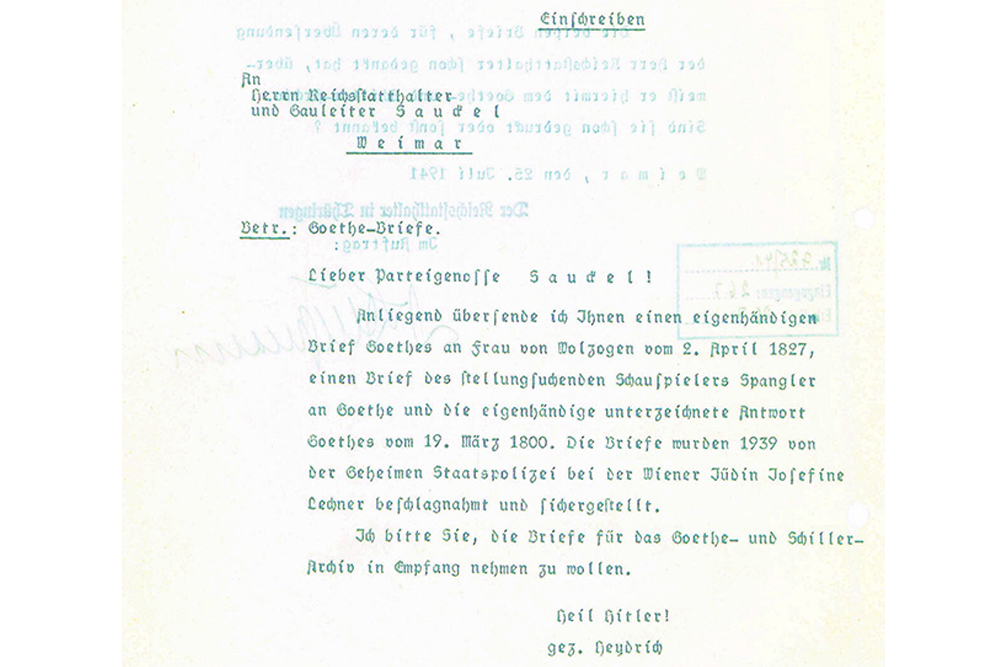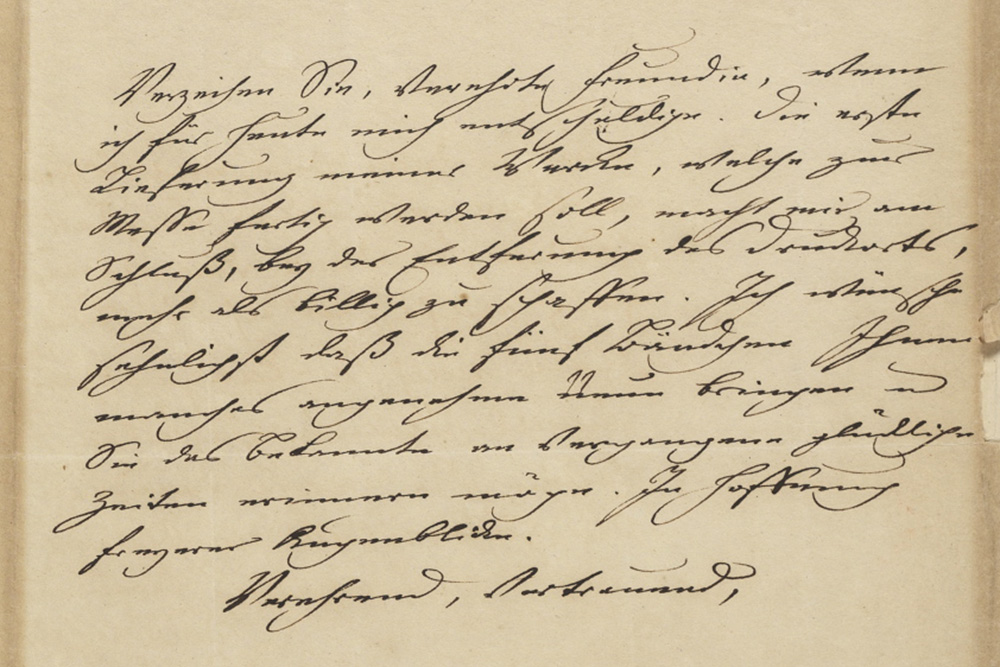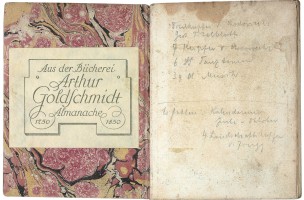The case of Josefine Lechner
by Romy Langeheine
>> read German translation here
Rarely can looted objects be identified as unambiguously as in the case of Josefine Lechner. In the files of the Goethe- und Schiller-Archiv, historians came across a letter dating from 1941.
In this letter, Reinhard Heydrich, head of the Reichssicherheitshauptamt (Central Office for the Security of the Reich), who controlled the Sicherheitspolizei (security police) and the Sicherheitsdienst (security service), asked the Thuringian Gauleiter (leader of an NSDAP district) Fritz Sauckel to accept two letters by Goethe on behalf of the Goethe- und Schiller-Archiv.
Heydrich did not conceal their origin:
“The letters were confiscated and secured in 1939 by the Geheime Staatspolizei from the Viennese Jewess Josefine Lechner.”
Letter from Reinhard Heydrich to Fritz Sauckel, NSDAP-Gauleiter in Thuringia, 16 July 1941: enclosed, Heydrich sends two letters by Goethe, requesting that Sauckel pass these on to the Goethe- und Schiller-Archiv. © Klassik Stiftung Weimar
Sauckel did as requested soon afterwards. He accepted the documents and handed them over to the archive.
Archive director Hans Wahl thanked him “nicely” for “letting us have the two letters.”
The team of provenance researchers gathered information from various sources and were eventually able to reconstruct a partial biography.
It was enough to confirm their suspicions with regard to looting: on 6 July 1870, Josefine Perutz had been born in Prague. Like her husband Karl Lechner she was of Jewish descent; they lived together in Vienna. When the Gestapo seized the letters, Josefine Lechner was by then widowed and almost 70 years old.
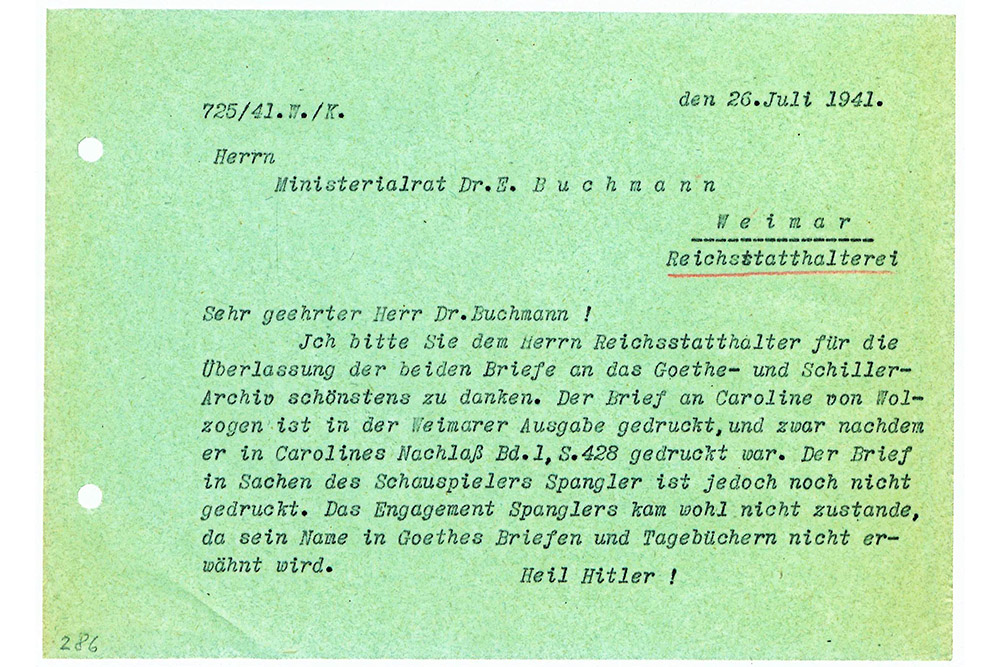
Letter from Hans Wahl, Director of the Goethe- und Schiller-Archiv and of the Goethe National Museum, to Erich Buchmann, the office manager of Fritz Sauckel, 26 July 1941: Wahl thanked him »nicely« for sending over the two letters by Goethe. © Klassik Stiftung Weimar
At this time, Josefine Lechner was planning to emigrate to Switzerland. In April 1938, the German Reich, which by then included Austria, passed the “Decree on the Registration of Jewish Property”.
Each Jewish person had to register and rate his or her assets, including artwork and cultural objects, provided the total value was above the threshold of 5,000 Reichsmark.
By means of this decree, the National Socialists intended to prevent emigrating Jews from taking assets or valuable art objects to safety abroad.
Josefine Lechner’s property declaration still exists, but details regarding the letters by Goethe are missing.
Letter from Johann Wolfgang von Goethe to Schiller’s sister-in-law Caroline von Wolzogen, 2 April 1827: this is one of two letters by Goethe which were owned by Josefine Lechner. © Klassik Stiftung Weimar
It can be assumed that the Gestapo searched Lechner’s flat prior to her emigration. The seized letters were first transferred from Vienna to the Reichssicherheitshauptamt (Reich Main Security Office) in Berlin and ultimately to Weimar.
With the help of the Jewish Community in Vienna, the provenance researchers of the Klassik Stiftung Weimar were able to track descendants of Josefine Lechner in Switzerland, where she had died in 1955.
In November 2011, the two letters by Goethe were restituted to the heirs; the archive retains facsimiles.
The Mobile display case presenting the case of Josefine Lechner, the history of a seizure due to Nazi persecution, will be exhibited until the end of January 2016 in the entrance hall of the Goethe- und Schiller-Archiv.
On the series “Nazi loot in the Klassik Stiftung Weimar”
In the collections of the Klassik Stiftung Weimar there is wrongfully acquired cultural property. Since 2010, the foundation systematically investigates so-called Nazi-looted cultural assets and aims to find fair and just solutions with those who were victims of persecution or their heirs. In 2011, the foundation included this task in its mission statement.
In several cases, objects identified as Nazi-looted cultural property could be returned to the heirs of the former owners. From 25 November, the Mobile display case informs about “Nazi-looted objects in the Klassik Stiftung.” Over the next few years, the Mobile display case will go on an itinerary through the entrance halls of the different institutions belonging to the Klassik Stiftung Weimar, presenting individual cases of particular interest.
At each location, which changes every three months, the display case will present objects identified as Nazi loot. At the same time, information about the history of persecution of the former owners will be given.

